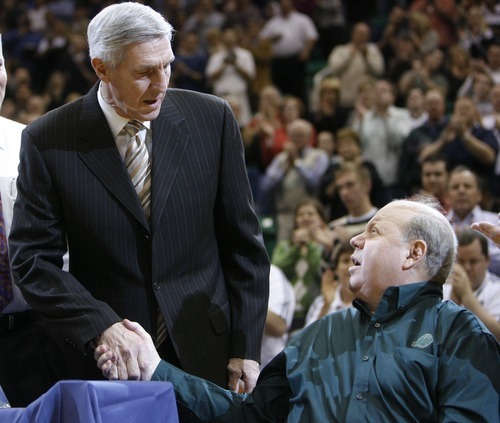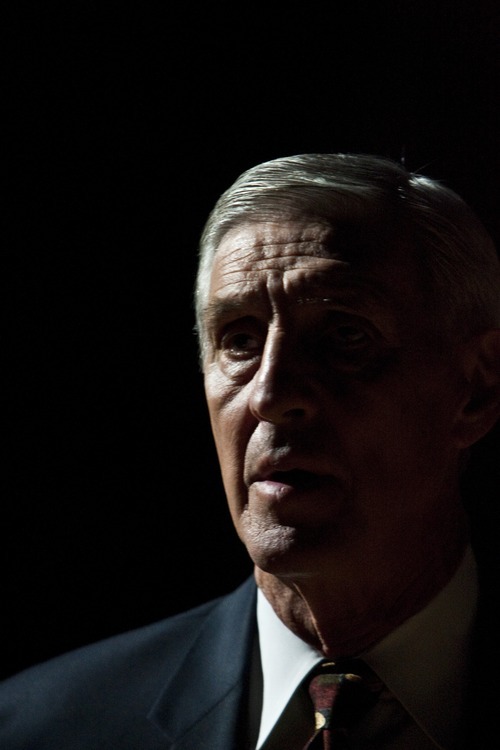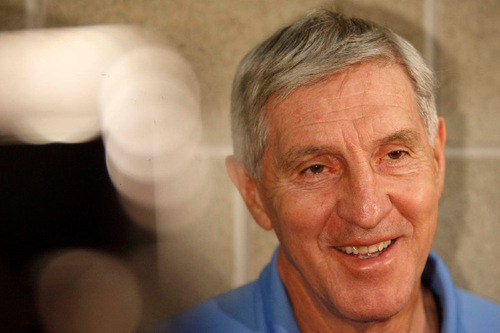This is an archived article that was published on sltrib.com in 2011, and information in the article may be outdated. It is provided only for personal research purposes and may not be reprinted.
Of the thousands of conversations I've had with Jerry Sloan over the years, my last one while he still coached the Jazz will probably end up being the most memorable.
It happened about an hour after his team played give-away during a 91-86 loss to the Chicago Bulls, of all teams, on Wednesday night at EnergySolutions Arena.
I had gone to the Bulls' locker room to help cover one of the biggest stories of the Jazz season to that point — the return of Carlos Boozer, Kyle Korver and Ronnie Brewer to Utah.
When I got back to the press room, I heard that Sloan still hadn't emerged from his office to address the media.
At first, it struck me merely as odd.
In his 23 years as head coach of the Jazz, this was the first time I could recall he'd ever kept reporters waiting.
Even after the most crushing defeats, Sloan always quickly made himself available to the media and answered questions with straight-shooting honesty that reporters loved and could make his players squirm.
I also wondered if Sloan was sick.
It was one plausible explanation for his tardiness.
After all, Sloan is 68 years old and the Jazz had just suffered the kind of loss that has always made his blood pressure jump like Michael Jordan.
They hadn't executed. They hadn't played with much passion or energy. They had defended only occasionally.
I decided to run down toward the Jazz locker room just to see what was happening.
On the way, I saw Sloan walking toward me.
He was headed home but looked like he'd just gone 12 rounds with Karl Malone.
As we came together, I said, "Jerry, are you all right?"
Sloan looked at me, his face pale and eyes sharklike dead and said, "Hi, how are you?"
He hadn't heard me.
He was lost in his world, zombie-like by what we found out later was his decision to resign and, perhaps, the events that led to it.
Less than 18 hours later, Sloan made it official.
The loss to Chicago, where he starred as a player and which had beaten him twice in the NBA Finals, would be the last of his 2,352 regular-season, playoff and preseason games as Utah's coach.
I started covering the Jazz on a regular basis during the 1986-87 season.
Sloan was Frank Layden's assistant at the time and, as such, my dealings with him were relatively limited.
I do remember one practice, however.
Before the explosion of sports talk radio and the Internet, practices were open to reporters.
I was watching Darryl Dawkins' first day with the Jazz, which had just acquired him from Philadelphia.
Dawkins was talented, but he was also brash and loud. He often talked better than he played.
His nickname was "Chocolate Thunder."
On this particular morning, it took Sloan about 20 minutes to tire of Dawkins, who was laughing and joking with his new teammates while paying little attention to what his new coaches were saying.
I could tell Sloan was becoming more agitated by the minute and watched the bubbling volcano in semi-amusement.
Finally, Sloan had had enough. He informed Dawkins that his conduct was not going to be tolerated.
Later, Sloan told me he would have kicked Dawkins out of practice if it had been his decision.
Not coincidentally, "Chocolate Thunder" ended up playing a grand total of four games for the Jazz.
Just 50 days after Utah acquired him, he was traded, surely to Sloan's great relief.
On Dec. 9, 1988, Layden stepped down as the Jazz's coach.
Despite an 8-2 start to the new season, Layden decided to devote his energy to his duties as general manager.
Sloan replaced him, but Dallas spoiled his head coaching debut with a 97-89 victory at the Salt Palace.
Sloan's first win came the next night, when John Stockton dominated the final minutes of a 110-102 win against the Clippers in Los Angeles.
Since that game — the first of his 1,121 victories with the Jazz — I have at least as many vivid memories of Sloan.
I remember his grace after Game 6 of the 1998 NBA Finals, when Jordan nudged aside Bryon Russell on his winning shot and the Bulls won another championship.
I remember covering the 2009 Hall of Fame induction of Sloan and Stockton and the crusty old coach's eloquence that had those in the audience straining to hear.
The words of a private man who literally feared the glare of such a public, intense spotlight were riveting.
I remember many of Sloan's friends from southern Illinois, especially Danny Brown, who survived horrific wounds suffered in Vietnam after being caught in an enemy ambush.
Sloan and Brown met while bidding against each other during a local estate sale.
Sloan prevailed, but his worthy opponent that day became someone he trusted enough to help watch his farm during the long NBA season.
I remember being in riot-torn Los Angeles during Utah's 1992 first-round playoff series against the Clippers.
During the four-day delay between Games 3 and 4, the Jazz practiced at Inglewood High School, which was located on the fringe of the worst violence.
As fires raged just blocks away and police cars sped back and forth along Manchester Boulevard, a group of reporters huddled together on the school steps.
The Jazz players and coaches arrived and walked into the gym.
Given the craziness of what was happening around us, I wondered if I really wanted to stand outside Inglewood High for the next 90 minutes.
Suddenly, the gym doors opened and a security guard appeared.
He waved us inside, saying the coach thought the reporters should wait inside while the Jazz practiced.
Sloan has always owned a unique ability to see a situation, analyze it and approach it with humanity and common sense.
For that, the reporters covering the Jazz practice on the violent morning in L.A. were extremely grateful.
In the video of country-western singer Neal McCoy's "The Last of a Dying Breed," baseball great Nolan Ryan and Malone make cameo appearances.
They are the last of a dying breed of athlete.
And Sloan?
He's among a dying breed of coaches, I'm afraid.
"He's a cold beer drinker, a buck 'n' bear hunter, the best friend a dog ever had.
"A posthole digger, a man Skoal dipper, a John Deere cap-sportin' man.
"With a house on a hill and a pond in the field, surrounded by a mess of corn rows.
"Makes a livin' from his labor, a credit to the Maker, he's somebody everybody knows."







